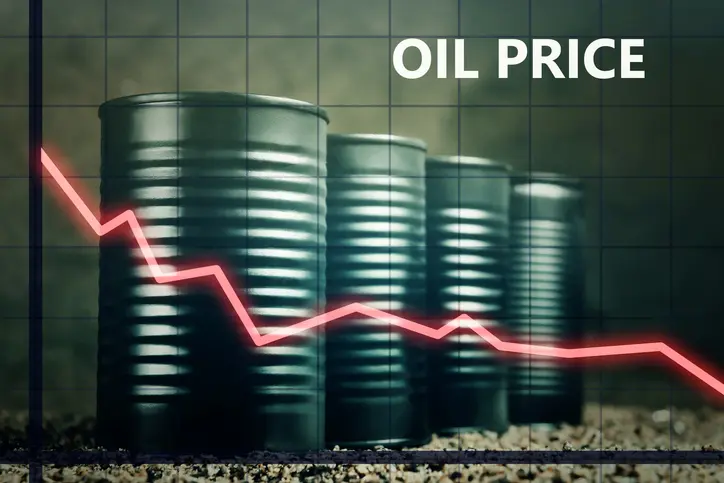
Wondering how record oil prices affect your fleet? Here is a summary of what the market is doing. Crude oil dropped to -$37.63 per barrel on Monday, leading to the lowest price experts have ever seen. Matter of fact, if you were trading futures for 70 years, you still wouldn’t see a price this low for oil commodities. Fleet managers across the United States are curious to what this means for their businesses and how they should react to the drastic price drop.
FUTURES MARKET DEFINED
Imagine a digital auction where you can buy and sell anything related to commodities (in this case crude oil) and futures contracts to be delivered on a future date. The point is to turn a profit by selling the commodity at a higher price than what was purchased before the time limit expires and the commodity is shipped for delivery. The inclusion of investors in the futures market helps manage volatility of prices as well as share the risk/reward for producers.
HOW CAN A COMMODITY HAVE A NEGATIVE PRICE?
The interesting part of this market is that most of the traders who are involved don’t want the physical delivery of the product to their location. There are also guidelines in place to prevent that sort of thing from happening. Think about it, if you purchase 10,000 barrels of crude oil, logistically it would be a nightmare to accept a delivery of that magnitude. The cost of unloading, moving, and storing wouldn’t be worth the hassle because it cuts into the profits. What is the next best thing when your time limit expires before you can sell your futures contract? Pay someone who has the capacity to accept and store a commodity for you. This leads to a negative price point since they are literally paying third parties to take their shipment from them.
HAS ANYONE EVER ACCIDENTALLY DELIVERED A LARGE COMMODITY?
Believe it or not, this happens from time to time. A story trending about a popular trader working for Æxecor did this exact thing. Although the story is embellished and the real names have been changed to protect the company from embarrassment, this person accidentally accepted a delivery of 28,000 tons of real coal. The persona of “Brad” being the expert trader (who claimed no one should question his methods) lead to his demise when confronted with a fleet of connected barges hauling his shipment to the pier just outside the location of his offices. Ultimately, if this story is true, the cause of the mistake was due to complacent coding errors mixed with an overexaggerated sense of self confidence.
Today, there are many “fail-safe” methods that are put in place to prevent the actual delivery. The odds of this happening are very slim nowadays. Brad ended up paying someone to take the shipment off his hands for .20 cents on the dollar.
WHAT IS CAUSING THE DRASTIC PRICE DROP IN OIL?
Although oil prices have been decreasing since the start of 2018 due to OPEC and Russian negotiations, the coronavirus pandemic is the main culprit for the overall low demand for oil. Everyone is practicing social distancing and not driving their cars as much if at all. This goes the same for airlines and cruise ships due to the travel restrictions. No need for travelling means no need for fuel/gas. Companies are already pinching pennies to survive these next few months, therefore they won’t be ordering the large shipments like they normally do. Oil companies (especially small ones), who are responsible for tens of thousands of jobs, will be forced to stop drilling and start lay-offs to combat the reduction in demand.
WHAT DOES OIL PRICE AFFECT YOUR FLEET?
If you are still considered an essential worker, then your business hasn’t stopped. In this case, the price drop for oil will be for your benefit in the short term. You will see cost of fuel and gas drop at the pump which will end up saving you money (if your fuel contracts don’t inhibit the savings). On the other hand, if the drastic drop in prices for crude oil continues for the long term, then it could lead to many trucking companies going out of business. There is a lot of shipping involved in the oil industry, for example, hauling frac sand, equipment, and so on. If the oil companies are forced to let go of their workers, then those trucking jobs will be lost as well. The price collapse will also hurt pension savings which are often invested in major oil companies through funds which track equity markets. The oil price crisis has already wiped billions from the market value of the largest oil companies, many of which will not be able to pay dividends if the market rout drags on.
HOW WILL OIL PRICES AFFECT THE US ECONOMY?
The good news is, unlike Russia and Venezuela, the United States economy does not fully rely on oil production as their main source of growth. Granted we have a lot of products that are created using oil like motor oil, plastics, clothes, solar panels, floor wax, ink, bearing grease etc, but we can survive this downturn and bounce back when everything goes back to normal. It also should be mentioned that an opportunity to increase US oil reserves is apparent and should be utilized for future cost savings. Today, the largest amount of oil is being stored in supertankers across the globe. A whopping 160m to be exact. Experts say by 3-6 months, the worst should be over. This could cause a strong economic recovery and prices will quickly bounce back.
Your fleet needs to find a way to cut costs now more than ever. Allow us a chance to beat the prices of your current provider by clicking here for a customized fleet roadside assistance plans. You can contact us by phone at 1-844-6ENCORE or fill out a contact form for more information.


Comments are closed